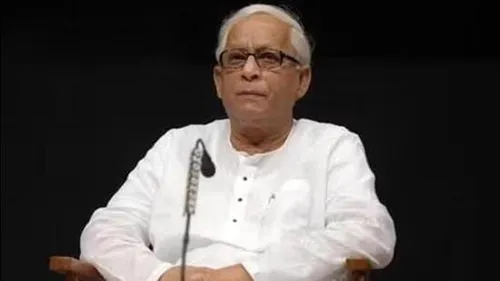The Legacy of Buddhadeb Bhattacharjee: Reflections on the Life and Impact of the Former West Bengal Chief Minister
Buddhadeb Bhattacharjee, the former Chief Minister of West Bengal, passed away following a heart attack, marking the end of an era in the state’s political history. As a prominent leader of the Communist Party of India (Marxist) [CPI(M)], Bhattacharjee’s political journey was deeply intertwined with the state’s socio-economic fabric. His tenure as Chief Minister, from 2000 to 2011, was characterized by efforts to modernize West Bengal, but also by controversies and challenges that ultimately led to the decline of leftist dominance in the state.
Table of Contents
Early Life and Political Beginnings
Born on March 1, 1944, in Calcutta (now Kolkata), Buddhadeb Bhattacharjee grew up in a politically active environment. He pursued his education at Presidency College, where he became deeply involved in student politics, eventually joining the CPI(M) in the 1960s. Bhattacharjee’s early political career was marked by his commitment to Marxist ideology and his involvement in the party’s cultural and literary wings, where he contributed as a writer and poet.
Bhattacharjee’s rise within the CPI(M) was steady, and he was elected to the West Bengal Legislative Assembly in 1977, the same year the Left Front came to power in the state. Over the years, he held various portfolios, including Information and Cultural Affairs, where he played a key role in promoting the state’s cultural heritage and film industry.
Tenure as Chief Minister
Buddhadeb Bhattacharjee’s ascent to the role of Chief Minister in 2000 marked a significant moment in West Bengal’s political landscape. He succeeded Jyoti Basu, one of the longest-serving chief ministers in India, and inherited a state that had been under leftist rule for over two decades. Bhattacharjee’s leadership was seen as a continuation of the Left Front’s policies, but with a focus on modernization and industrialization.
One of Bhattacharjee’s most significant initiatives was his push for industrial development in West Bengal. He sought to attract investments from major corporations, both domestic and international, to revitalize the state’s economy, which had been lagging behind other states in terms of industrial growth. His vision was to transform West Bengal into an industrial hub, creating jobs and boosting the state’s economy.
However, Bhattacharjee’s industrialization drive was not without controversy. The acquisition of land for industrial projects, particularly in Singur and Nandigram, led to widespread protests and violence. The displacement of farmers and the perception of the government being pro-corporate alienated a significant section of the rural population, which had traditionally been the Left Front’s stronghold. The Nandigram incident, in particular, where police action led to the deaths of several protestors, became a turning point in Bhattacharjee’s political career and severely damaged the CPI(M)’s image.
The Fall of the Left in West Bengal
The controversies surrounding land acquisition and industrialization, coupled with a growing disillusionment among the electorate, paved the way for the decline of the Left Front in West Bengal. In the 2011 state elections, the Trinamool Congress (TMC) led by Mamata Banerjee capitalized on the popular discontent and swept to power, ending the 34-year-long rule of the Left Front. Bhattacharjee’s efforts to modernize the state were overshadowed by the backlash from the rural populace, leading to the CPI(M)’s worst electoral defeat.
Following the defeat, Bhattacharjee gradually withdrew from active politics, citing health reasons. However, his influence within the CPI(M) and West Bengal’s political discourse remained significant. He continued to be a respected figure in leftist circles and was often consulted on matters of party strategy and ideology.
Legacy and Impact
Buddhadeb Bhattacharjee’s legacy is a complex one. On one hand, he is remembered as a leader who sought to bring about economic progress and modernization in West Bengal. His tenure as Chief Minister was marked by efforts to attract investment, improve infrastructure, and promote education and culture. However, his policies on land acquisition and industrialization also led to significant unrest and ultimately contributed to the decline of the Left Front in the state.
Bhattacharjee’s contributions to the cultural and literary landscape of West Bengal are also noteworthy. He was a poet, writer, and translator, deeply engaged in promoting Bengali literature and cinema. His tenure as the Minister for Information and Cultural Affairs saw the revival of the state’s film industry and the establishment of institutions that continue to nurture Bengali culture.
Conclusion
Buddhadeb Bhattacharjee’s death marks the end of a significant chapter in West Bengal’s political history. His life and career encapsulate the challenges and contradictions of leftist governance in a rapidly changing India. While his tenure as Chief Minister was marked by both achievements and controversies, his commitment to his principles and his efforts to navigate the complexities of governance in West Bengal will be remembered as a defining aspect of his legacy. His passing leaves a void in the state’s political and cultural landscape, and his contributions will continue to be debated and discussed in the years to come.








